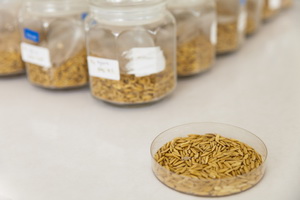
Researchers Use CRISPR to Improve Nutrient Use Efficiency of Rice
June 20, 2018| |
 Rice is one of the most important targets for plant breeders to secure enough food for a growing population. Producing nutrient efficient crops has become essential to secure enough food as well as to eliminate environmental consequences of using fertilizers. The team of Nahed Mohammed from the University of York in the UK aims to explore the genetic diversity of rice to identify genotypes with high efficiency under Nitrogen (N), Phosphorus (P), and Potassium (K) deficient conditions.
Rice is one of the most important targets for plant breeders to secure enough food for a growing population. Producing nutrient efficient crops has become essential to secure enough food as well as to eliminate environmental consequences of using fertilizers. The team of Nahed Mohammed from the University of York in the UK aims to explore the genetic diversity of rice to identify genotypes with high efficiency under Nitrogen (N), Phosphorus (P), and Potassium (K) deficient conditions.
The team wants to identify loci linked to NPK use efficiency using Genome Wide Association Studies (GWAS). Lastly, the team aimed to manipulate a proton pump using the CRISPR-Cas9 system to improve mycorrhiza-dependent nutrient uptake. Analyses of the 294 rice genotypes identified a set of genotypes as relatively tolerant to NPK nutrient limitation.
The GWAS study revealed new and previously known QTLs and genes related to NPK efficiency. Several genes involved in sodium transport were also identified as candidates. The team was also successful in using the CRISPR-Cas9 system to manipulate several candidate genes identified from GWAS, in addition to the rice H+-ATPase (OsHA1).
The results of the study can be used as a basis to conduct similar studies in other crops, which can contribute to food security.
For more information, read the article in White Rose eTheses Online.
| |
Biotech Updates is a weekly newsletter of ISAAA, a not-for-profit organization. It is distributed for free to over 22,000 subscribers worldwide to inform them about the key developments in biosciences, especially in biotechnology. Your support will help us in our mission to feed the world with knowledge. You can help by donating as little as $10.
-
See more articles:
-
News from Around the World
- Study Shows Farm Income and Production Impacts of GM Crop Technology from 1996 to 2016
- AATF Receives Multi-million Grant for Bt Maize Commercialization in Africa
- Agriculture Minister Proposes a Law to Regulate Seeds and Seed Varieties in Namibia
- High-protein Maize Shows Resistance to Parasitic Weed
- Critical Plant Gene Takes Detour that Could Boost Biofuel Yields
- HarvXtra® Alfalfa Trait Deregulated in Argentina
- Australian OGTR Invites Comments on GM Canola Field Trials
- "Pink Bollworm Management Strategy" Book Now Available in Gujarati
- Plant Defense Genes Rewired to Reduce Crop Waste
- New Type of Photosynthesis Discovered
-
Research Highlights
- GmNMH7 Inhibits Root and Nodule Development in Soybean
- IbSnRK1 Gene Improves Starch Content and Quality in Sweet Potato
-
Announcements
- GPMB 2018
- World Food Day 2018 Poster Contest
-
Plant
- Downregulation of C3'H Gene in Rice Alters Cell Wall Structures
- Scientists Find Candidate Gene for Improving Potassium Deficiency Tolerance in Rice
- APETALA2 Gene Key to Improving Seed Production in Brassica Species
- Researchers Use CRISPR to Improve Nutrient Use Efficiency of Rice
-
Read the latest: - Biotech Updates (February 18, 2026)
- Gene Editing Supplement (January 28, 2026)
- Gene Drive Supplement (February 22, 2023)
-
Subscribe to BU: - Share
- Tweet
